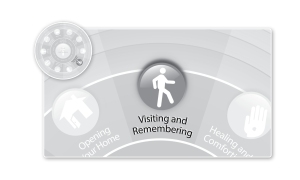Part VIII of our series on Visiting and Remembering
 By loving others and caring for them in their time of need, we mirror God’s care to them in both body and soul during times of great need. That was the message of our last post.
By loving others and caring for them in their time of need, we mirror God’s care to them in both body and soul during times of great need. That was the message of our last post.
This care for the whole person culminates in achieving the purpose for every instance of visiting and remembering: imparting the life of God.
That’s also the purpose of praying for one another.
Prayer and sacraments are how God becomes visible to both the visitor and the one being visited. You can see this in Scripture when Jesus appears to the disciples on the Emmaus Road right after his resurrection. Pay attention to how Jesus conducts the perfect visitation by imparting life through the Word of God, prayer, and the breaking of bread:
That very day [Easter] two of them were going to a village named Emmaus, about seven miles from Jerusalem, and they were talking with each other about all these things that had happened. While they were talking and discussing together, Jesus himself drew near and went with them. But their eyes were kept from recognizing him. And he said to them, “What is this conversation that you are holding with each other as you walk?” And they stood still, looking sad.
Then one of them, named Cleopas, answered him, “Are you the only visitor to Jerusalem who does not know the things that have happened there in these days?”
And he said to them, “What things?”
And they said to him, “Concerning Jesus of Nazareth, a man who was a prophet mighty in deed and word before God and all the people, and how our chief priests and rulers delivered him up to be condemned to death, and crucified him. But we had hoped that he was the one to redeem Israel. Yes, and besides all this, it is now the third day since these things happened. Moreover, some women of our company amazed us. They were at the tomb early in the morning, and when they did not find his body, they came back saying that they had even seen a vision of angels, who said that he was alive. Some of those who were with us went to the tomb and found it just as the women had said, but him they did not see.”
And he said to them, “O foolish ones, and slow of heart to believe all that the prophets have spoken! Was it not necessary that the Christ should suffer these things and enter into his glory?” And beginning with Moses and all the Prophets, he interpreted to them in all the Scriptures the things concerning himself.
So they drew near to the village to which they were going.He acted as if he were going farther, but they urged him strongly, saying, “Stay with us, for it is toward evening and the day is now far spent.” So he went in to stay with them.
When he was at table with them, he took the bread and blessed and broke it and gave it to them. And their eyes were opened, and they recognized him. And he vanished from their sight. They said to each other, “Did not our hearts burn within us while he talked to us on the road, while heopened to us the Scriptures?” (Luke 24:13–32)
You can see from Jesus’ example that a prayer that invokes God’s presence and aid is something more than just saying, “God, please be with this person.” John Wesley has some great guidance here. His best point is that we should pray to God about what we should pray about!
Be sure to conclude every meeting with prayer. If you cannot yet pray without a form, you may use some of those composed by Mr. Spinckes, or any other pious writer. But the sooner you break through this backwardness the better. Ask of God, and he will open your mouth.
Whenever, therefore, you are about to enter upon the work, seek his help by earnest prayer. Cry to him for the whole spirit of humility, lest if pride steal into your heart, if you ascribe anything to yourself, while you strive to save others you destroy your own soul. Before and through the work, from the beginning to the end, let your heart wait upon him for a continual supply of meekness and gentleness, of patience and longsuffering, that you may never be angry or discouraged at whatever treatment, rough or smooth, kind or unkind, you may meet with.
Be not moved with the deep ignorance of some, the dullness, the amazing stupidity of others; marvel not at their peevishness or stubbornness, at their non-improvement after all the pains that you have taken; yea, at some of them turning back to perdition, and being worse than they were before. Still your record is with the Lord, and your reward with the Most High.
“The amazing stupidity of others”—that’s a great phrase, isn’t it? But notice that Wesley says that this amazing stupidity is actually a blessing because it ensures that we are visiting for the right reason.
We shouldn’t do the Work of Mercy of visiting people just because we enjoy meeting new people or cheering others up when they are sad.
Instead, we should do it as an act of self-emptying—our reasonable service of worship to God.
When have your efforts at Christian love been met with the “amazing stupidity of others”? What did you do about it?










